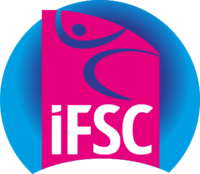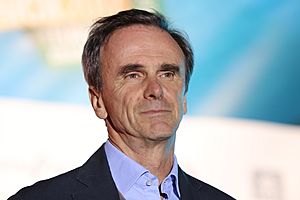International Federation of Sport Climbing facts for kids
 |
|
| Formation | 27 January 2007 |
|---|---|
| Type | Sports federation |
| Headquarters | Turin, Italy |
|
Membership
|
98 member federations |
|
President
|
Marco Maria Scolaris |
The International Federation of Sport Climbing (IFSC) is like the main boss for the exciting sport of competition climbing. This sport includes three cool styles: lead climbing, bouldering, and speed climbing. The IFSC makes sure everything runs smoothly for climbing competitions around the world.
Contents
What the IFSC Does
The IFSC is the top group for all international competition climbing. They are in charge of everything about the sport. This includes making the rules for competitions. They also approve all the climbing groups that are members. The IFSC sets the calendar for all the big climbing events each year. The International Olympic Committee (IOC) officially recognizes the IFSC. This means the IOC sees the IFSC as the official group for sport climbing.
History of the IFSC
The IFSC started in Frankfurt, Germany, on January 27, 2007. It was created by 57 climbing groups from different countries. Before the IFSC, there was a group called the International Council for Competition Climbing. This group had been around since 1997. It was part of a larger mountain climbing organization.
Later in 2007, the IOC gave the IFSC temporary recognition. At that time, the IFSC had 80 member groups. On February 10, 2010, the IOC fully recognized the IFSC. This was a big step for the sport. On July 4, 2011, the IOC considered adding climbing to the 2020 Tokyo Olympic Games. This was confirmed in 2016, making climbing an Olympic sport.
Because of a conflict, the IFSC paused activities with the Russian and Belarusian climbing groups. They also stopped all events in Russia during 2022.
Major Climbing Competitions
The IFSC organizes several big competitions. These events bring together the best climbers from around the world.
IFSC Climbing World Cup
The IFSC Climbing World Cup is a series of events held every year. Climbers compete in lead, bouldering, and speed disciplines. The number of events and locations changes each year. The first World Cup was held in 1989. The IFSC has been in charge of the World Cups since 2007.
IFSC Climbing World Championship
The IFSC Climbing World Championship happens every two years. This competition decides who the world champions are. There are champions for men and women in lead, bouldering, and speed climbing. There are also champions for para-climbing, which is climbing for athletes with disabilities.
IFSC Climbing World Youth Championship
The IFSC World Youth Championship is held every year. This event finds the best young climbers in the world. Young athletes compete in lead, speed, and bouldering. They are divided into three age groups: Youth B, Youth A, and Juniors.
IFSC Climbing European Championship
The IFSC European Championship takes place every two years. It happens in the years when there is no World Championship. This event crowns the European champions. Both male and female climbers compete in lead, bouldering, and speed.
IFSC Climbing European Youth Cup
The IFSC European Youth Cup is a series of competitions held annually. Young climbers compete in lead, speed, and bouldering. Like the World Youth Championship, they are grouped into Youth B, Youth A, and Juniors.
IFSC Presidents
- 2007- : Marco Maria Scolaris has been the president since the IFSC started.
Member Countries
The IFSC has many member federations from countries all over the world. These are the national groups that manage sport climbing in their own countries. There are 98 member federations in total. They are divided into full members, continental members, regional members, and observers. This shows how popular sport climbing is globally.
See also
 In Spanish: Federación Internacional de Escalada Deportiva para niños
In Spanish: Federación Internacional de Escalada Deportiva para niños
- IFSC Climbing World Championships
- IFSC Climbing World Cup
- IFSC Climbing European Championships
- Paraclimbing
 | Claudette Colvin |
 | Myrlie Evers-Williams |
 | Alberta Odell Jones |


